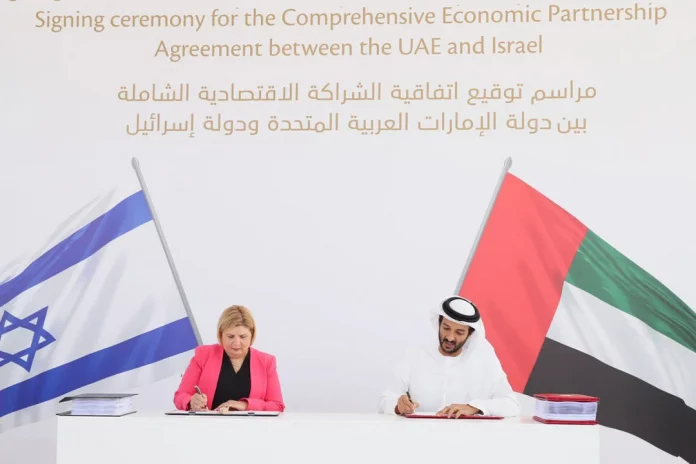On 31 May 2022, Israeli and UAE government leaders signed a free-trade agreement that, if ratified, will be the most comprehensive of its kind between Israel and an Arab country, and the latest illustration of the Jewish state’s growing connections with some Arab governments.
After months of discussions, it was signed in Dubai by Minister of Economy and Industry Orna Barbivai and her colleague, UAE Minister of Economy Abdulla bin Touq Al Marri.
Tariffs on 96% of items traded between the two countries will be eliminated or lowered. The UAE estimated that the Comprehensive Economic Partnership Agreement would increase annual bilateral commerce to more than $10 billion within five years.
The agreement demonstrates the long-term viability of the Abraham Accords, which normalized relations between Israel and four Muslim countries in 2020: the United Arab Emirates, Bahrain, Morocco, and Sudan. The accords were the most significant diplomatic breakthrough in Israel’s ties with its neighbors in decades, and the Israel-Emirati trade agreement is one of the most tangible outcomes of the agreement.
Israeli corporations setting up production in the United Arab Emirates, which acts as a hub for the Middle East, Asia, and Africa—markets where Israel has struggled to get a foothold—is a long-term aspiration for both countries.
The agreement was the UAE’s second free trade agreement, following a similar agreement with India in February. It is negotiating trade agreements with several countries, including Indonesia and South Korea.
Following the coronavirus pandemic, the UAE has worked to boost its economy and position as a key economic hub.
Industries that FTA benefits
Free trade agreements help address cross-border barriers that would otherwise obstruct the trade of products and services, boost investment, and enhance regulations governing issues like intellectual property, e-commerce, etc.
Businesses and consumers benefit from free trade agreements because they have better access to a greater selection of competitively priced goods and services, new technologies, and innovative practices.
Free trade agreements foster regional economic integration and the development of common trade and investment methods.
Over time, free trade agreements can further benefit trading partners through built-in agendas that drive continued internal reform and trade liberalization.
Other FTAs Signed by UAE
Some other FTAs signed by UAE are:
- USA
- Saudi Arabia
- Kuwait
- Qatar
- Oman
- Jordan
- Egypt
- Iraq
- Lebanon
- Morocco
- Tunisia
- Palestine
- Syria
- Libya
- Yemen
Other FTAs Signed by Israel
Israel is currently a signatory to two free-trade accords that have yet to enter into force:
- South Korea
- The United Arab Emirates
Israel is in talks with the following countries and trade blocs on bilateral free trade agreements:
- Australia
- Eurasian Economic Union
- Guatemala
- India
- Japan
- Vietnam
The conclusion of the negotiations represents a watershed moment in history. This is the first full free trade agreement with an Arab country, and it is taking place so soon after diplomatic relations were established.


